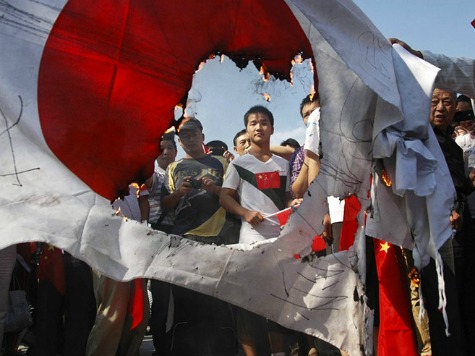
This morning’s key headlines from GenerationalDynamics.com:
- Japan bolsters defenses as 1,000 Chinese fishing boats approach
- China declares economic war on Japan
- Chinese Communist Party urges punitive sanctions against Japan
- Quote: ‘There won’t be a war because it’s bad for business!’
- Should we defend Japan against China?
Japan bolsters defenses as 1,000 Chinese fishing boats approach
The Japanese embassy in Beijing has suspended passport services and isbolstering its defenses around the Senkaku/Diayou islands, after mediareports indicate that a flotilla of around 1,000 Chinese fishing boatswas sailing towards them. Hundreds of Japanese businesses and thecountry’s embassy suspended services in China on Tuesday, expectingfurther escalation in violent protests over a territorial disputebetween Asia’s two biggest economies. Reuters
China declares economic war on Japan
China is trying to hurt Japan economically, to gain leverage in itscampaign to take control of the Senkaku/Diayou islands. In the 2010confrontations, China took revenge on Japan by terminating shipmentsof rare earth minerals, needed for manufacturing of many of Japan’selectronic products. In the current confrontation, the Beijinggovernment is encouraging the Chinese people to demonstrate andprotest against Japanese businesses in China. The government urgedprotesters not to use violence, but that part of the message isclearly not getting through. Protesters torched a Panasonic factoryand Toyota dealership, looted and ransacked Japanese department storesand supermarkets in several cities. China’s National TourismAdministration ordered travel companies last week to cancel tours toJapan over the weeklong National Day holiday in early October.AP and Bloomberg
Chinese Communist Party urges punitive sanctions against Japan
The Chinese Communist Party (CCP) is urging strong punitive sanctionsagainst Japan, for its “well-orchestrated plan” to take control of theSenkaku/Diayou islands, according to the CCP’s official newspaper:
The “nationalization” of the Diaoyu Islands by Japanafter “purchasing” them from a “private owner” is ridiculous andcannot change the fact that they are Chinese territory. … Chinashould take strong countermeasures, especially economic sanctions,to respond to Japan’s provocations. Military consideration,however, should be the last choice.
The United States has frequently used Article XXI SecurityExceptions of the WTO (taken from the earlier General Agreement onTariffs and Trade) to impose economic sanctions on othercountries. The security exception clause says a country cannot bestopped from taking any action it considers necessary to protectits security interests. That means a country can impose sanctionson enterprises, financial institutions, organizations and evenother countries’ central and local governments. Taking a cue fromthe US’ practice, China can use the security exception clause toreduce the export of some important materials to Japan.
China didn’t announce any sanctions against the Philippines inApril, but it froze banana imports from that country in responseto Manila’s aggressive attitude in the Huangyan Islanddispute. Though the economic countermeasure forced the Philippineson the back foot, it also harmed the interests of some Chineseenterprises.
So it is important for China to devise a sanction plan againstJapan that would cause minimum loss to Chinese enterprises.
Quote: ‘There won’t be a war because it’s bad for business!’
How many times have people told me that Generational Dynamics is wrongabout some geopolitical thing, saying, “There won’t be a warbecause it’s bad for business, and the business owners on both sideswill make sure that there won’t be a war.” That whole concept issilly since, of course; if it were true then there never would be anywars.
But now you’re seeing that in fact “bad for business” does not STOPwar preparations, it PROPELS them. The fact that “business is good”between Japan and China does not mean there won’t be a war; to thecontrary, “business is good” only becomes an additional weapon to beused in the preliminaries. And as the quote above from China Dailynotes, China has already used economic warfare against the Philippinesof the Scarborough Shoal, some islands that are clearly thePhilippines’ sovereign territory. The Chinese aren’t saying that awar would be bad for business. They’re saying, let’s use economicwarfare, and if that doesn’t work, then we’ll use military warfare.
The Chinese always talk about how they want “harmonious relations”with everyone. What they mean by that is, “Relations will beharmonious as long as you do everything we demand, and give useverything we want. Otherwise, we’ll kill you.”
Should we defend Japan against China?
Some web site readers of my previous article had a a heated discussionover whether we should come to Japan’s defense against China, in viewof the horrific atrocities that the Japanese committed during WorldWar II. Leading the “anti” side of the debate was someone from theSilent generation who experienced some of those atrocities.
I have two points to make. The first is something I’ve said before:The United States has no choice. The U.S. became Policeman of theWorld with the Truman Doctrine, put forth by President Harry Truman in 1947. Since then,we’ve signed defense treaties with numerous countries, and all of themwould go into total panic if we repudiated our treaty with Japan.
The second is more generational. Once upon a time, theBritish and the colonists committed atrocities on one another.A little later, the North and South committed atrocities on oneanother. In WW II, Germany and Italy joined Japan as ourenemies, while Russia was our friend. Since then, newgenerations have replaced all of those people. In some cases,the new generations decided they like us, and in othercases the new generations decided they hate us. New Americangenerations are barely aware of the atrocities our enemiescommitted, and they’re equally unaware of such things asthe firebombing of Dresden or the nuking of Japan.
A generational crisis war transforms a country, gives the country anew character, and makes it a different country than it was before thecrisis war. World War II transformed America completely, changing itfrom a laissez-faire economy to a heavily regulated economy, and froman isolationist nation to the Policemen of the World. Essentially,every nation starts from “square one” in the Recovery Era thatfollows a crisis war.
Permanent web link to this article
Receive daily World View columns by e-mail

COMMENTS
Please let us know if you're having issues with commenting.